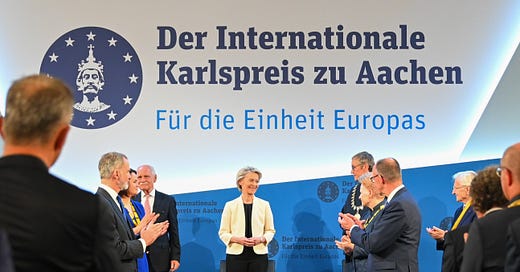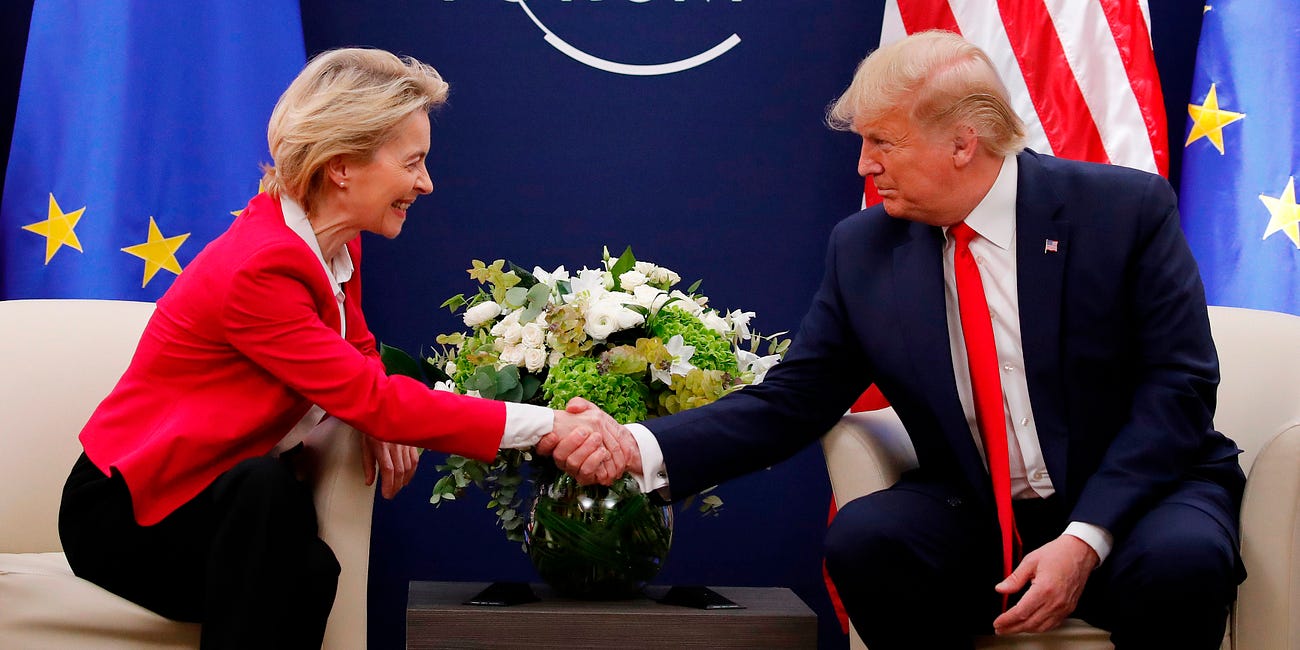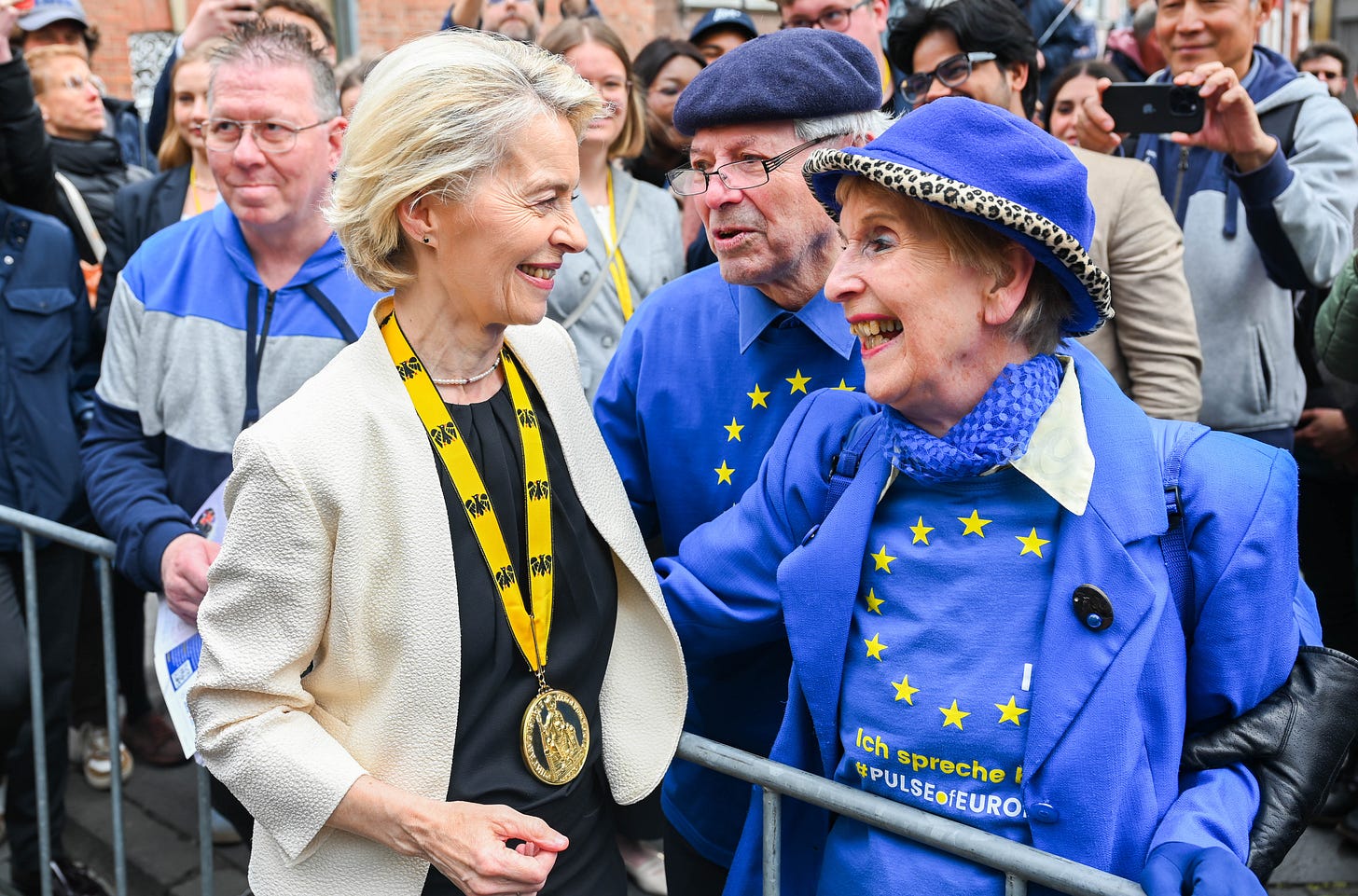Despite her new tone, VDL is still afraid to criticise America by name
President von der Leyen says the EU's main focus must now be "building an independent Europe" and "casting off our shackles". But she won't name who Europe must become independent from.
European Commission President Ursula von der Leyen went further than she’s ever done this week in calling for the European Union to take distance from the United States. Accepting the Charlemagne Prize at a ceremony in Aachen, the one-time capital of the Frankish Empire where the eponymous emperor is interred, the EU president called for a new “Pax Europaea for the 21st century”. The implicit suggestion, of course, was that it should replace the Pax Americana of the 20th century. But the latter phrase did not leave her lips. In fact, though her speech calling for “building an independent Europe” seemed to be casting itself as revolutionary, she never dared to name the power from whom independence should be sought. “Building an independent Europe will require us to cast off our shackles,” she boldly declared. But she never informed her audience who had put the shackles on. There was only one direct reference to the US, when she said, “we want to put our trading partnership with the US back on a stronger footing.” But the rest of the speech was clearly full of barely-veiled references to America and the threat the Trump regime poses to Europe.
“A new international order will emerge in this decade,” she said. “If we do not want to simply accept the consequences this will have for Europe and the world, we must shape this new order. History does not forgive either dithering or delaying. Our mission is European independence.”
“What we once relied on as an international order has rapidly descended into an international disorder. The world is again marked by imperial ambitions and imperial wars. By authoritarian powers ready to mercilessly exploit our divisions or dependencies. By major powers ready to utilise all means – fair or foul – to gain an advantage. For too long, too many of us thought these kinds of events were consigned to the history books.”
But while she name-checked Russia as a baddie at the doorstep, she declined to mention by name the other “major powers” she’s referring to. “There is no greater example of that than Putin's brutal and ruthless war against Ukraine,” she said. OK, but what are the other examples? She didn’t name any. “An independent Europe; I know that for some this is an uncomfortable message to hear,” she told the audience. But it isn’t exactly revolutionary for a European politician to be boldly criticising Russia in 2025. Europe is not dependent on Russia, and except for the Warsaw Pact countries during the Cold War, it never has been. We all know who Europe is dependent on. But the words “America”, “United States” or “Trump” made no appearance in her entire speech.
Nevertheless, it was clear who she was talking about. "We all know that our democracies have come under attack – with concerted efforts from external adversaries, but also by attempts to erode it from within," she said, in a clear reference not only to Russian disinformation but also to the Trump regime’s support for Europe’s far-right parties including the AfD. Today’s presidential election in Poland has seen interference from the US government, with the US Secretary of Homeland Security campaigning for the far-right candidate in Poland on Friday. “We cannot once again fall for the fallacy that the storm will pass,” von der Leyen said in Aachen. “That things will go back to how they were before – if only the war would end, or a tariff deal be struck, or the next elections have a different outcome. No, they will not. Because the geopolitical cross-currents are strong.” She also made an opaque reference to Trump’s war on US universities and foreign students, saying the EU still values science.
Had any other European leader been saying these words, I would have been very excited. But given they were coming out of the mouth of President von der Leyen, a long-time Atlanticist who herself presided over the very EU self-delusion she criticised in her speech (insisting things had gone back to normal with Biden during her first term from 2020 to 2024), I just can’t get enthused. My congratulations to the speechwriter, who must be very clear-eyed about the threat we face. I wonder if there were explicit references to the US and China in the first draft that were later taken out. In the end, it’s hard for me to believe that von der Leyen actually feels motivated by these words coming out of her mouth, that she’s really ready to lead Europe’s independence revolution. Nothing about her political career to date indicates that she has the boldness to do this.
Contrast von der Leyen’s speech with the words of von der Leyen’s defence commissioner Andrius Kubilius, who was also there in Aachen and gave a speech specifically with the title “Europe without the US - is it possible?”. He gave away the game about von der Leyen’s speech when he tweeted out a much more direct summary that did have the boldness to mention by name the country from whom the threats von der Leyen was describing are coming. “Pax Europea in short:,” he summed up, “United States - out”.
“It is not only possible, but it is our duty as Europeans to be ready to assume the sole responsibility for the defence of Europe,” he said in a speech in Aachen earlier that day. “It will not be easy to defend Europe only by Europeans, but that is what we must be ready to do. We will need to take care not only about the material side of defence: how many weapons we need to produce and procure. But also about the institutional and political side of the issue: how to organise European defence on our own.”
While I think making MAGA references for other things is cringy and pathetic (it was especially so when Viktor Orban made ‘Make Europe Great Again’ the official slogan of the Hungarian rotating presidency of the EU Council last year), I do like Kubilius’s slogan “Make Europe Independent Again” - because it is in effect the opposite of what Orban is all about. Orban wants the illusion of national sovereignty while under the actual dominance of Russia, America or both. But EU countries will never truly have sovereignty on their own, sovereignty can only come from strength through European federation. The “Again” in MEIA harks back to long-lost European glory of the pre-WW2 era (appealing to a European pride that decades of centrist governments on this continent have sought to stifle). And the “Europe” and “Independent” points out that true independence from Russia, America and China can only be achieved by Europe as a whole, not by individual nation-states.
Kubilius is no anti-American radical. He is a conservative former prime minister of Lithuania. He also stressed during his speech that while “American forthcoming withdrawal from Europe is a new reality…this is not because Americans do not love Europeans anymore, but because global geopolitical reality and security challenges are changing very rapidly and radically.” I would disagree with him on this, because it is clear the Trump regime loathes European governments (who just this week the US State Department accused of waging “an aggressive campaign against Western civilization”) and is actively supporting far-right parties that want to unseat European them. But the point is that Kubilius wasn’t afraid to mention the US by name. So why is von der Leyen?
This isn’t some semantic coincidence in this particular speech. Von der Leyen has been loathe to say anything that might even resemble criticism of the Trump regime. At a rare press conference in March to mark the first 100 days of her second term (held on a Sunday in what was likely a deliberate attempt to lower journalist turnout), she was asked if the EU should adopt a similar “de-risking strategy” in its relationship with the US as von der Leyen adopted toward China a few years ago (she specifically called the new outlook toward Beijing “de-risking but not de-coupling”). She bristled at the suggestion, saying the answer is a “clear no”.
"It’s a completely different relationship with the United States than we have with China," she said, incredulous. Later in the press conference, asked about the fact that Donald Trump was refusing to take her phone calls (the two only spoke officially for the first time since Trump took office last week), she denied reality by insisting the EU and US were having good communication and she would meet with Trump "when the time is right” - as if this was a matter of her choosing rather than Trump blowing her off.
Contrast this with the words of Canadian Prime Minister Mark Carney, who has not been afraid to spell out specifically the need to de-risk Canada’s relationship with the United States. "The 80-year period [of American leadership] is over,” he said in a speech last month. “While this is a tragedy, it is also a reality. We must respond with both purpose and force. We are masters in our own home." And he is taking action, curtailing Canadian purchases of American weapons and seeking to buy from Europe instead. Here in Europe, we can only dream of leaders who are so clear-eyed and direct about the American threat we face.
The EU president clearly feels emboldened to inch closer to criticising the United States because of Frederik Merz’s blunt talk about Europe needing “independence from the United States” immediately after he was elected German chancellor in February. She is only following his lead, not leading herself, and she is doing so in a much less direct and bold way. But this is the type of Commission president she is. As I discussed with Julien Hoez in our Substack Live on Friday, she often seems to cast herself as a civil servant executing the Council’s orders rather than a leader in her own right, even though her position gives her every ability to lead if she wanted. But this aspect of her personality is, of course, why the EU leaders chose her twice. One of the deepest flaws of the EU system is that the president is chosen by the 27 national leaders, and they have every incentive to choose people who will not challenge them - at the expense of the EU’s strength and influence in the world.
What a week: live with Dave Keating and Julien Hoez
This week was a week of ‘no’s. No to Trump’s “retaliatory” tariffs, no to Catalan becoming an official EU language, and no to President von der Leyen’s commissioners attending the illegal Budapest Pride on 28 June.
It is good that President von der Leyen is now speaking more forcefully about EU independence, but it seems like she is always three steps behind. Already in January, an ECFR survey found that only one in five people in the EU now consider the United States an ally. Only 22% in the EU, and 15% in the UK, think Trump’s election was a good thing. Obviously, feelings have only intensified since then with the military and economic threats against Europe coming from Washington. And yet for the past five months von der Leyen and other European leaders (particularly Keir Starmer) have had warm words for Trump - talking about what a great ally the United States is in direct contradiction to what citizens can see with their own eyes.
Von der Leyen is unlikely to defend Europeans from Trump
As Donald Trump prepares to enter the White House again today, he’s facing a world that looks dramatically different from the one he encountered on January 20th 2017. At that time the world was reacting to the shock victory of Donald Trump, who himself seemed surprised by the win, by closing ranks. The Republican establishment moved quickly to surround …
Von der Leyen is from the exact generation of Atlanticist leadership on this continent that has consented to these American “shackles”, so it is unlikely that she is the woman to cast them off. As much as I welcome her Damascene conversion this week, she’s going to have to be a lot more bold to convince me she is serious about doing what it takes to rescue Europe from the dangerous situation her generation of Atlanticist leaders have put it in.
President von der Leyen is, in the end, a symptom rather than a cause of this European helplessness. She is who she is and where she is because this continent has collectively buried its head in the sand and refused to see what was developing across the Atlantic. Both von der Leyen and Trump are symptoms of their respective unions’ deep flaws. She may not be the president we want, but she is the president we have. Let’s hope that she’s serious about doing what will be necessary to save Europe. Because the words of her speechwriter are absolutely right. History does not forgive either dithering or delaying. And at its core, this is about our freedom.









